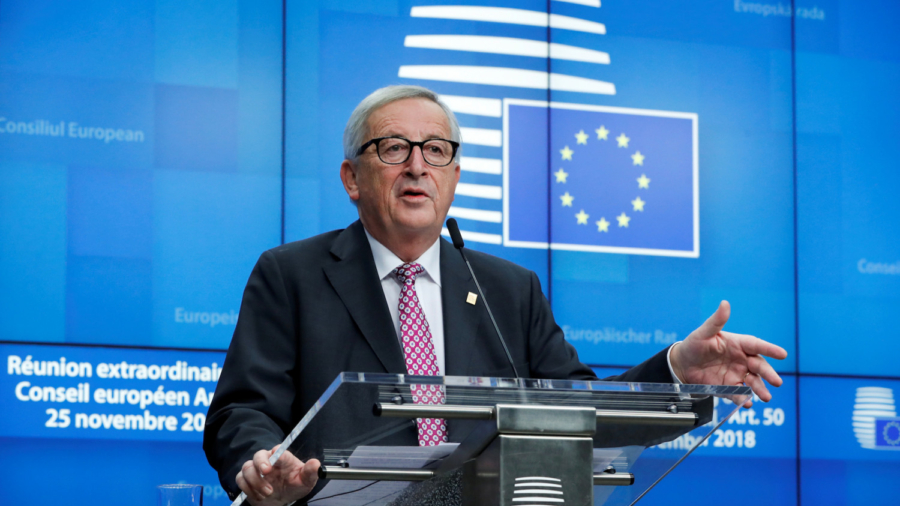European Commission President Jean-Claude Juncker has told the UK that there will be no renegotiation of the Brexit withdrawal deal despite Prime Minister Theresa May’s failure so far to win enough support among British lawmakers to ratify the agreement.
“The deal we have achieved is the best deal possible—it’s the only deal possible,” Juncker said at the European Parliament in Strasbourg, Belgium, on Dec. 11. “So there is no room whatsoever for renegotiation.”
“But there is room,” Juncker added, “to give further clarifications.”
He said the best Britain’s prime minister could hope for was “further clarity and further interpretations without reopening the withdrawal agreement” when she meets EU leaders in Brussels this week.
May is desperate to gain concessions from the EU on the deal she struck last month after it met with a frosty reception by British lawmakers, with colleagues from her own party opposed to its “backstop” clause that would keep the UK in a customs union with the EU.
She postponed a planned vote on the agreement after it became clear that British politicians would give it a thumbs down.
Juncker described Brexit as “a surprise guest” at the European Council summit scheduled for this end of this week, adding, “I am surprised because we had reached an agreement on Nov. 25 together with the government of the UK.”
European Council President Donald Tusk announced on Dec. 10 that he had called a meeting of the EU Council for Dec. 13 to discuss how to “facilitate UK ratification.”
I have decided to call #EUCO on #Brexit (Art. 50) on Thursday. We will not renegotiate the deal, including the backstop, but we are ready to discuss how to facilitate UK ratification. As time is running out, we will also discuss our preparedness for a no-deal scenario.
— Donald Tusk (@eucopresident) December 10, 2018
Tusk insisted, however, that “We will not renegotiate the deal, including the backstop.”
“As time is running out,” he said, “we will also discuss our preparedness for a no-deal scenario.”
The Backstop
In his remarks in Strasbourg, Juncker defended the so-called “backstop” provision on the Ireland-Northern Ireland border, which has been the focus of opposition among British lawmakers.
The backstop, described as an insurance policy or safety net, is a clause in the EU-UK divorce agreement that is meant to prevent the separation of Northern Ireland and the Republic of Ireland by a hard border.
European officials insisted on the backstop out of fear that a hard border between the two countries might lead to a resurgence of sectarian violence.
The backstop insurance clause would be triggered only if no formal deal is reached in the future between the EU and Britain on trade and security. It would work by having Northern Ireland stay in the EU customs union and much of the single market, ensuring passage between the two countries remains friction-free.
“We have a common determination to do everything to be not in a situation one day to use that backstop,” Juncker said, referring to the hope that future negotiations of an EU-UK trade and security pact prove successful.
“But we have to prepare,” the Commission president added. “It’s necessary for the entire coherence of what we have agreed. It’s necessary for Britain and it’s necessary for Ireland. Ireland will never be left alone.”
‘We Don’t Play This Game’
Juncker was followed by the leader of the European People’s Party group, Manfred Weber, who accused May of trying to reopen Brexit negotiations.
“Now, now we see again, a try of renegotiating the whole thing,” Weber said, according to Politico. “I think we lost already too much time discussing Brexit.”
Weber, who is a candidate for Commission president in next year’s European election, said European lawmakers would not be dragged into a new round of Brexit haggling.
He said, “We don’t play this game.”
Weber added that if the British side was demanding further reassurance and clarification, the EU should also demand clarification from the UK about what it actually wants in terms of a future economic relationship, an issue that remains far from settled.
“If we can have clarity on these points, it would help a lot to speed up these negotiations,” he said. “When the British colleagues are asking for additional clarifications we can also consider to do so.”
‘Just a Bad Dream’
Theresa May’s government has insisted all along that there would be no going back from Brexit, but as the likelihood of failure to win approval for her negotiated deal looms closer, political winds have been building behind a second referendum.
May had insisted that lawmakers have only two options: accept her negotiated deal, or “crash out” of the EU with no deal. But many lawmakers reject this binary choice, and believe that there is a third way.
The Good Law Project, one of the parties making a case for a second referendum, said in a statement, “It can be, legally, like the decision to Brexit was just a bad dream.”
The European Court of Justice, meanwhile, ruled on Dec. 10 that if the UK chose to back out of Brexit, it could do so unilaterally, without needing a nod of approval from other EU states confirming Britain would be welcome back.
Reuters contributed to this report.


